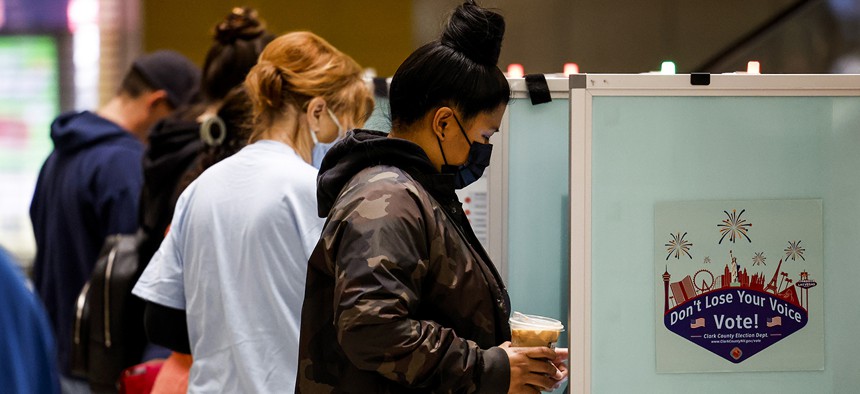2024 mission for state and local leaders: Protect democracy

Voters stand in voting booths as they fill out their ballots at a polling center at the Meadows Mall on Nov. 08, 2022 in Las Vegas, Nevada. Anna Moneymaker / Staff via Getty Images
COMMENTARY | By making voting easy, transparent and secure, state and local leaders can ensure election systems remain strong in 2024.
In less than 12 months, democracy itself will once again be on the ballot. Optimism filled my soul when election deniers lost key 2022 elections from Pennsylvania to Michigan to Arizona. I clung to the hope that losing at the ballot box would break the far-right’s anti-democratic fever that resulted in the violent events of Jan. 6, 2021. Unfortunately, un-American efforts and rhetoric to undermine our faith in democracy persist, and it will take a determined effort by state and local leaders to ensure our election system remains strong in 2024.
Many pro-democracy election laws were passed in state legislative sessions this year, particularly in places like Minnesota and New Mexico, but we can't count solely on new legislation to protect elections. In the coming months, state and local officials must use every tool under existing law to fight against forces seeking to undermine our elections. There is no time to lose.
Here are three steps every official can take to protect the right to vote.
Make voting accessible and transparent
In a healthy democracy all voices are heard, and that means making voter registration as easy as possible for every eligible voter. Elected officials should use social media to share the online registration websites and partner with local media to publicize voter registration drives at popular events such as football games. In addition, officials can work with local businesses to encourage workers and patrons to register. But it takes more than registration. If mail-in voting is an option, officials must be transparent about the process. Online tracking can and should be implemented and promoted so voters can track the progress of their absentee ballot, from the moment they request a ballot to the minute it is counted.
Make voting easy
In 2020, Americans voted in record numbers despite the COVID pandemic. Election officials worked tirelessly to make voting easier, and there is no reason to roll back that progress. Where vote by mail is permitted, localities should make sure residents know how to take advantage of it. Further, early voting continues to increase in popularity. Where allowed by law, voters should be able to cast their ballot at a central voting location in a county, rather than in a specific precinct, during the early voting period.
And finally, election officials must take special care to ensure ballot access for historically disenfranchised groups such as voters of color and young voters. Polling centers—and secure drop-boxes, where permitted—should be located conveniently for as many people as possible, and election officials should work with community leaders to ensure voting locations are accessible.
Protect votes, voters and election officials
Nearly a quarter of local election officials experienced threats of violence, harassment or other instances of abuse as the result of their work, a 2022 nationwide survey found.
Threats and violence targeting election workers cannot be tolerated. It is imperative that election officials partner with community leaders and law enforcement to ensure the safety of all election workers. Further, elected officials must work with prosecutors to ensure cases of election interference targeting voters—including threats of violence, voter harassment and interference—are prosecuted to the fullest extent of the law.
Election officials should always be on the alert for inaccurate or misleading information, so correct information can be promptly provided through all available channels. They should address falsehoods quickly and matter-of-factly and use both social media and relationships with reporters to push accurate information.
Misinformation around election results can also be countered by transparency about the voting process. For example, nearly every jurisdiction tests voting machines before elections. Such testing should be open to the public. Widely publicizing the testing engages journalists and blunts potential arguments from bad-faith actors seeking to undermine elections. Another way officials can be transparent about the process is by conducting a post-election risk-limiting audit, which consists of publicly hand-counting a sample of paper ballots to show the accuracy of the mechanical counting method. According to the Brennan Center, such audits “confirm whether votes are recorded and tallied accurately—and, in turn, help restore public confidence in elections.”
These ideas, and many more, are part of the NewDEAL Forum’s Democracy Playbook, which contains more than 40 specific recommendations for strengthening and protecting democracy.
Just as voters protected democracy in 2022, I have faith they will do so again in 2024. Election officials must ensure voters’ voices are heard. There’s no time to lose.





